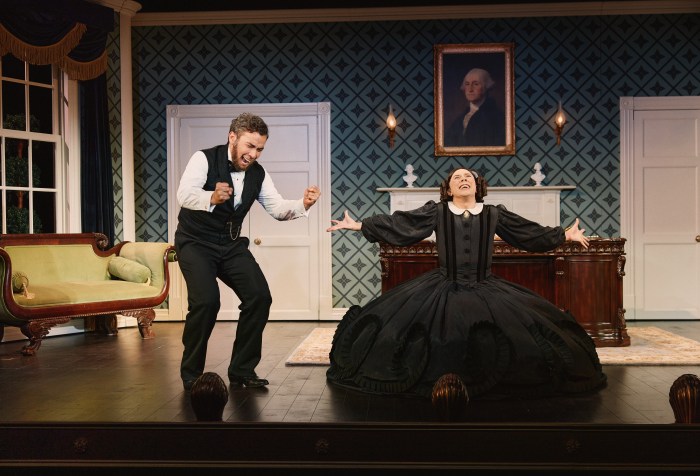Amidst death and adultery, pals can hurt as much as help
A close-knit group of friends gathers to carp about their failed relationships and derailed dreams. One has settled for a lackluster career, another has settled for a lackluster romantic partner. One has a drinking problem, another commits adultery. And yep, one is gay. Biting wit, in the form of impossibly clever dialogue, is the salve that helps soothe the pain. Self-delusion and self-deprecation abound.
Surely we’ve all seen this type of scenario played out a thousand times before. Besides being a staple in theater, this territory has been trod ad nauseum in television — from “Seinfeld” to “Friends” to “Dawson’s Creek.” Even “Gossip Girls” and “Melrose Place” offer salacious variations on the theme.
Do we really need another contemporary, edgy dramedy of disgruntled, endearingly flawed friends?
Well, if the playwright is Melissa James Gibson, the answer is a resounding yes.
In “THIS,” Gibson, along with director Daniel Aukin, has taken this mind-numbingly tired conceit and crafted an insightful, surprisingly sharp, sophisticated comedy. The pair caused a sensation with previous collaborations, including “[sic]” and “Suitcase.” Although far from perfect, this nimble, nuanced work will surely earn them even more attention.
Despite a hackneyed premise, Gibson adds just enough quirks to keep these friends, stumbling headlong into middle age, feeling fresh. The central failing relationship belongs to Tom (Darren Pettie) and Marrell (Eisa Davis, from “Passing Strange”), married with a wailing newborn who refuses to sleep. Tom is a cabinetmaker who likes to fill the apartment with junk, while the frantic Marrell, when not writing reminder notes to keep quiet or to buy Brita filters, is a piano player/ singer at a local lounge (she actually performs two numbers, an unexpected, welcome touch). They bicker with a rancor reserved for spouses in need of a good couples therapist.
Another character with relationship issues (and a host of other problems) is Jane (Julianne Nicholson). Except her ills stem from her husband’s sudden death a year earlier; the trauma has emotionally crippled her more than she knows. A sometime poetry teacher and standardized test proctor, she’s vaguely disillusioned with her career. She proves to be guilty of adultery, as well.
The caustic, self-deprecating gay is Alan (Glenn Fitzgerald), who is much more than just the bitchy life of the party. Forever wishing he were somebody else, he earns a living as a mnemonist — a person with an amazing gift for photographic memory — making television appearances. Single, lonely, and resigned to being more witty than good-looking, he is a self-admitted “latenik” and “reply-aller.” He’s the play’s resident alcoholic and the prince of one-liners.
The final character, Jean-Pierre (Louis Cancelmi, who turned heads in Craig Lucas’ “The Singing Forest” at The Public earlier this year), is not a member of the gang but an alluring interloper who has everything they don’t—a fantastic, fulfilling vocation (a physician with Doctors Without Borders), drop-dead gorgeous looks, a charming personality, and a vibrant, don’t-sweat-the-small-stuff zest for life.
On paper, the four remorseful friends would seem odious company indeed. But the expert ensemble imbues each with a level of humanity that draws us in, allowing us to recognize aspects of ourselves and loved ones. Nicholson is particularly affecting as the neurotic, rudderless Jane, and Fitzgerald is devilishly sidesplitting as Alan.
The piece’s naturalism is enhanced by Gibson’s clipped, crackling Mamet-esque dialogue, where most lines are only three or four words long. Under Aukin’s direction, the intermissionless two hours zip by with just a few minor bumps.
Special kudos must be given to Louisa Thompson’s casually realistic scenic design. Her cluttered apartment really looks lived in, reflecting the overwhelmed psyche of the characters, freighted by years of accumulated dreck.
More than a comedy of manners, more than a chronicle of the ins and outs of friendship, “THIS” attempts to shed light on why these bonds break or bind. When the friends play a game where they trick one player into inventing their own story, the work suggests how, despite being buffeted by really bad things (mortality, infidelity), we ultimately have more control than we realize. In fact, we have the power to write our own stories to help navigate the pain. With, naturally, a little help from our friends.
So when I proclaim that “THIS” is like a lost episode of “Thirtysomething,” I mean it as a compliment. For some theatergoers, however, that might not be enough.
Complete Information:
THIS
Playwrights Horizons
416 W. 42nd St.
Tue.-Sat. at 8 p.m.
Sun. at 7:30 p.m.
Sat., Sun. at 2:30 p.m.
Through Jan. 3
Or 212-279-4200


































